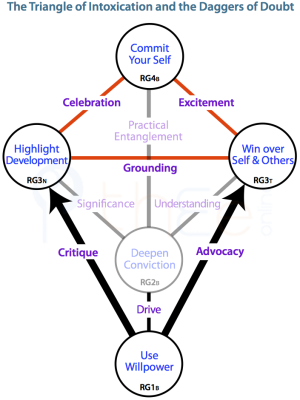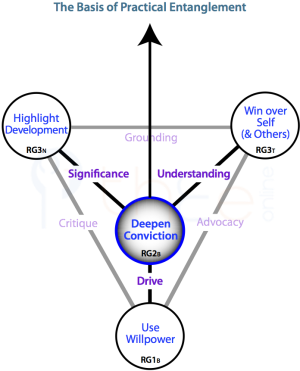Intoxication & Conviction
Being in Love is an Enthusiasm
is about being taken over, possessed, and by a God! It is therefore irresistible. Throw in hormones and and an intoxicating triangle envisaging a wonderful future of endless happiness results. It would be wonderful if it could go on forever.

In this context, recall the components of enthusiasm:
- —feeling alive and happy inside
- —feeling valued for more than good looks
- —feeling united and open to each other
- —having a lot in common and being mutually fascinated
- —doing things together and loving it.
Each person knows (as a matter of fact) that any life together, following being in love, is a voyage into the unknown. THEE members know (from this inquiry) that the Triangle of Intoxication is part of something much bigger: the Tree of Being Creative. This awareness gives you an advantage in understanding what is going on.
The base of the Triangle of Intoxication is subject to influences from based in personal autonomy. The alone determines whether or not entanglement (i.e. a life together) is chosen. This interaction between and appears as two daggers that may empower or hinder .
- Dagger of Deliberate Criticism: Specific events, activities, traits or developments are highlighted and analysed. They may strengthen or they may weaken the desire for entanglement. The outcome will also affect about the relationship.
- Dagger of the Devil's Advocate: Self-interested reflection may reassure, condone and even incite an for the relationship. However, there is also the potential for issues to be raised, for impediments and complications to be identified, and for suspicions or doubts to be sown.
Identity Issues
Many individuals, especially those focused on power, have a weak sense of self. Poor in these two entanglement Channels can lead to unrealistically positive critiques and self-serving reassurance. It may be the heart of romance, but it is surely also the basis of consecutive marriages and divorces. If the real person is never there, then the drive for conviction becomes weak, and proper advocacy and critiques do not occur.
A weak person can also use to prevent relationships progressing at all. The unwilling partner seems to be phobic about commitment. If persistent, the result could be an existence without sustained intimacy. However, a crucial influence of is its effect on . Choosing to be entangled without bothering about is possible, but it places a heavy strain on , as explained below.
Conviction about Commitment

is not an optional extra in a relationship. Look at the components of conviction in a relationship context:
- —are you devoted to each other?
- —are you 'into' each other?
- —is the definition of the relationship right?
- —does each feel possessive (but not jealous)?
- —do personal judgements in the relationship work out?
- —are the small things pointing in the right direction?
The diagram with at the focus shows the influences (aside from ) that determine these states.
The drive unleashed by is by far the most significant. A strong person simply decides who to chase and optimistically starts the dialogue.
The other two Channels to the state: develop understanding and reveal significance are also relevant. Properly activated they clarify and confirm the quality of and other components of .
Originally posted: 30-Mar-2012